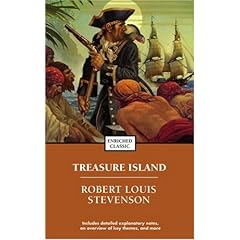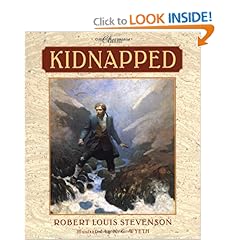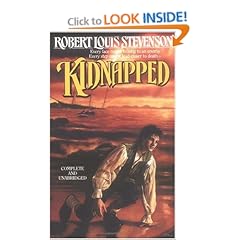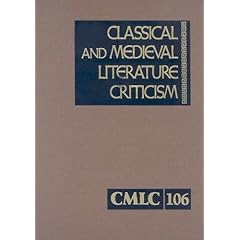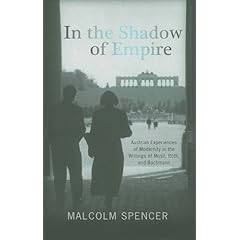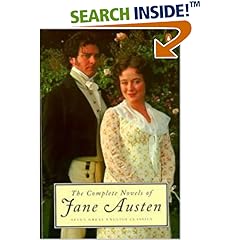This blog contains something related to Literature such as drama, novel, literary research, film
Showing posts with label Classic Literature. Show all posts
Showing posts with label Classic Literature. Show all posts
Tuesday, May 19, 2009
Robinson Crusoe (Dover Thrift Editions)
From School Library Journal
Grade 7 Up-Defoe's classic novel of shipwreck and survival, now nearly 300 years old, is abridged competently in this recording. The flavor of the 18th century language is retained, but the plot moves along at a pace more appealing to 21st century ears. The reader, Martin Shaw, has a pleasant voice, but unfortunately tends to trail off at the ends of sentences, losing whole words. As with all abridgements, large sections of the story and entire characters are omitted, but since most of the book tells of Crusoe's solitary sojourn on the island, this is not a major problem. This version is no substitute for the original, but it would be a supplemental purchase in libraries where abridgements are popular.
Sarah Flowers, Santa Clara County Library, Morgan Hill, CA
Copyright 2000 Reed Business Information, Inc. --This text refers to an out of print or unavailable edition of this title.
Review
(in full The Life and Strange Surprizing Adventures of Robinson Crusoe, of York, Mariner: Who Lived Eight and Twenty Years, All Alone in an Un-inhabited Island on the Coast of America, Near the Mouth of the Great River of Oroonoque; Having Been Cast on Shore by Shipwreck, Wherein All the Men Perished but Himself. With an Account how he was at last as Strangely Deliver'd by Pyrates. Written by Himself.) Novel by Daniel Defoe, published in 1719. The book is a unique fictional blending of the traditions of Puritan spiritual autobiography with an insistent scrutiny of the nature of men and women as social creatures, and it reveals an extraordinary ability to invent a sustaining modern myth. The title character leaves his comfortable middle-class home in England to go to sea. Surviving shipwreck, he lives on an island for 28 years, alone for most of the time until he saves the life of a savage, whom he names Friday. The two men eventually leave the island for England. Defoe probably based part of Crusoe's tale on the real-life experiences of Alexander Selkirk, a Scottish sailor who at his own request was put ashore on an uninhabited island in 1704 after a quarrel with his captain. He stayed there until 1709. The book was an immediate success in England and on the European continent, and Defoe wrote a sequel (The Farther Adventures of Robinson Crusoe) that was also published in 1719. Many stage and film adaptations have been made of Robinson Crusoe's life, and the book has spawned many imitations, including Johann Wyss's Swiss Family Robinson. -- The Merriam-Webster Encyclopedia of Literature --This text refers to an out of print or unavailable edition of this title.
Treasure Island (Enriched Classics Series)
Product Description
The epic tale of a young man's quest to capture a hidden treasure on the open seas -- one of the best-loved adventure stories of all time.
EACH ENRICHED CLASSIC EDITION INCLUDES:
• A concise introduction that gives readers important background information
• A chronology of the author's life and work
• A timeline of significant events that provides the book's historical context
• An outline of key themes and plot points to help readers form their own interpretations
• Detailed explanatory notes
• Critical analysis, including contemporary and modern perspectives on the work
• Discussion questions to promote lively classroom and book group interaction
• A list of recommended related books and films to broaden the reader's experience
Enriched Classics offer readers affordable editions of great works of literature enhanced by helpful notes and insightful commentary. The scholarship provided in Enriched Classics enables readers to appreciate, understand, and enjoy the world's finest books to their full potential.
About the Author
Robert Louis Stevenson (1850-1894) was a novelist, poet, short-story writer, and essayist. In 1883, while bedridden with tuberculosis, he wrote what would become one of the best known and most beloved collections of children's poetry in the English language, A Child's Garden of Verses. Block City is taken from that collection. Stevenson is also the author of such classics as Treasure Island, Kidnapped, and The Strange Case of Dr. Jekyll and Mr. Hyde.
Kidnapped (Scribner Storybook Classics)
Grade 3-7 - The language in this adaptation is truer to the original, and thus, more sophisticated than that of Deborah Kestel's "Great Illustrated Classics" version (Playmore, 1992). After his father's death, David Balfour leaves his simple life in the Scottish Lowlands and sets out to find an uncle whom he has never met. Unaware of the bad blood between his father and uncle, he arrives at Ebeneezer's home, only to find that the cruel man has no intention of granting the lad his rightful inheritance. In fact, he has the boy kidnapped aboard a ship to be sold as a slave in North Carolina. David's tenacious spirit and his friendship with the rebellious Jacobite Alan Breck eventually bring him to safety. Told in 11 brief chapters, this abridgement introduces the basics of the story while maintaining a feel for the Scottish dialect. Some of the old-fashioned words and phrases may be a bit of a stretch for readers, but can be understood in context. Though obviously lacking in some of the details of the original, the narrative is easy to follow. Readers are able to gain insight into the hearts of David and Alan, although Ebeneezer and Captain Hoseason remain rather flat. Wyeth's oils (which appeared in the full-length version) add a sense of realism and capture interesting historical details. Meis's retelling retains the flavor of Stevenson's rollicking tale and might inspire readers to search out the full-length epic. - Nancy Menaldi-Scanlan, LaSalle Academy, Providence, RI
Copyright © Reed Business Information, a division of Reed Elsevier Inc. All rights reserved.
Product Description
David Balfour has never had an adventure. He has never spent a night camping in the Scottish Highlands. He has never sailed the high seas. He has never fought in a battle. In fact David Balfour has never even left home. All he knows is a quiet country life.
All this changes after the death of his parents. He suddenly learns that he, David Balfour, is a man of wealth and standing, and that he is not destined for a simple life after all. All he needs to do to assume this new station in life is to travel to the town of Cramond, Scotland, to collect his inheritance from his father's younger brother, an uncle he had not even known existed. But David soon discovers that this is not as simple as it sounds, as he struggles to survive and outwit his treacherous uncle in this classic adventure story.
Original oil paintings by N. C. Wyeth capture the vitality of Robert Louis Stevenson's timeless tale of fortune, camaraderie, betrayal, and independence.
Treasure Island and Kidnapped (Cliffs Notes)
Product Description
These novels of pirates on the high seas and intrigue in the Scottish highlands were written on a challenge by Stevenson's teenage stepson to "write something really interesting." The results are these fast-moving and adventurous books, simple and entertaining.
From the Back Cover
Cliffs Test Preparation Guides help students prepare for and improve their performance on standardized tests ACT Preparation Guide CBEST Preparation Guide CLAST Preparation Guide ELM Review GMAT Preparation Guide GRE Preparation Guide LSAT Preparation Guide MAT Preparation Guide MATH Review for Standardized Tests MSAT Preparation Guide Memory Power for Exams Police Officer Examination Preparation Guide Police Sergeant Examination Preparation Guide Police Management Examinations Preparation Guide Postal Examinations Preparation Guide Praxis I: PPST Preparation Guide Praxis II: NTE Core Battery Preparation Guide SAT Preparation Guide SAT II Writing Preparation Guide TASP Preparation Guide TOEFL Preparation Guide with 2 cassettes Advanced Practice for the TOEFL with 2 cassettes Verbal Review for Standardized Tests Writing Proficiency Examinations You Can Pass the GED Cliffs Quick Reviews help students in introductory college courses or Advanced Placement classes Algebra I Algebra II Anatomy & Physiology Basic Math and Pre-Algebra Biology Calculus Chemistry Differential Equations Economics Geometry Linear Algebra Microbiology Physics Statistics Trigonometry Cliffs Advanced Placement Preparation Guides help high school students taking Advanced Placement courses to earn college credit AP Biology AP Calculus AB AP Chemistry AP English Language & Composition AP English Literature & Composition AP United States History Cliffs Complete Study Editions are comprehensive study guides with complete text, running commentary and glossary Chaucer's Prologue Chaucer's Wife of Bath Hamlet Julius Caesar King Henry IV, Part I King Lear Macbeth The Merchant of Venice Othello Romeo and Juliet The Tempest Twelfth Night See inside back cover for listing of Cliffs Notes titles Registered trademarks include: GRE, MSAT, the Praxis Series, and TOEFL (Educational Testing Service): AP, Advanced Placement Program, and SAT (College Entrance Examination Board); GMAT (Graduate Management Admission Council); and LSAT (Law School Admission Council.) Treasure Island & Kidnapped
Kidnapped (Tor Classics)
From School Library Journal
Grade 6 Up-Kidnapped by Robert Louis Stevenson remains one of the classic coming-of-age stories for children and young adults today. After the death of his father, David Balfour sets out to meet his uncle and claim his inheritance. This adventure takes him through the highlands of Scotland where he embarks upon a long journey back from treachery and deceit. The reading by David Rintoul, whose voice is easily recognizable from his roles in several PBS productions such as Pride and Prejudice, translates the written word into an auditory landscape of Scotland. He interprets each character using several voices. As the story progresses, listeners can hear David changing from an uncertain and hesitant youth, to the assured and forthright young man he becomes at the conclusion. Without any special effects, the fight among the crew of the Coventry in the RoundhouseAchairs pushed over, the sounds of the sea hitting against the great shipAbecomes easily visualized. the reader's skill setting the stage and showing the growth of the character is phenomenal. While this is an abridgement, the story flows easily and gives a full picture from beginning to end. This audiobook is a wonderful way to introduce this style of literature to young readers who may feel inhibited by reading the language of Stevenson. Whether read for enjoyment or to enrich the learning experience, this is a must for every serious library collection of the classics.
Tina Hudak, Takoma Park Maryland Library, MD
Copyright 2000 Reed Business Information, Inc. --This text refers to the Audio Cassette edition.
From Library Journal
Editor Menikoff insists that Stevenson's novel has been unfairly relegated to young adult fiction. To remedy that, he restored the text to its original form, reinstating deleted passages and Stevenson's original punctuation. The text is buttressed with 19th-century drawings from the book's serializations and an introduction that explains the book's nexus and puts it into its Scottish cultural context. (Classic Returns, LJ 5/15/99)
Copyright 2000 Reed Business Information, Inc. --This text refers to the Hardcover edition.
Classical and Medieval Literature Criticism
Here is the best classic literature that you must know. If you want to know the criticism of literature in Medieval era, which belongs to classic, you must read this book. Buy this book soon!
In the Shadow of Empire: Austrian Experiences of Modernity in the Writings of Musil, Roth, and Bachmann (Studies in German Literature Linguistics and
In the Shadow of Empire: Austrian Experiences of Modernity in the Writings of Musil, Roth, and Bachmann (Studies in German Literature Linguistics and Culture)
Product Description
Austria was not the only European country whose old order disintegrated in the early twentieth century, giving way to the crisis of modernity, nor the only country whose literature bears the marks of this crisis. But modernity's onset was experienced
differently in Austria: in the words of Karl Kraus, it served as "laboratory for the fall of world civilization." This book examines the crisis as reflected in fiction written by Robert Musil, Joseph Roth, and Ingeborg Bachmann between 1920 and 1970. After examining the elusive concept of modernity, Malcolm Spencer looks at the responses of the three authors to the central themes of modernity: fragmentation, nationalism, the end of empire, and ambivalence. Chapters on Musil examine his understanding of the ancien régime in Austria and his analysis of the ideological stage of modernity. Spencer then considers Roth's more negative reaction, showing the post-imperial novel Radetzkymarsch to be a nostalgic response to the collapse of Habsburg Austria and the rise of fascism. The final chapter looks again at the end of empire, not in the work of writers who lived through it, but through that of one who experienced it as a historical and cultural legacy: Ingeborg Bachmann.
About the Author
Malcolm Spencer is an Honorary Research Fellow at the University of Birmingham. He teaches German and French at Walton High School, Stafford, UK
Product Description
Austria was not the only European country whose old order disintegrated in the early twentieth century, giving way to the crisis of modernity, nor the only country whose literature bears the marks of this crisis. But modernity's onset was experienced
differently in Austria: in the words of Karl Kraus, it served as "laboratory for the fall of world civilization." This book examines the crisis as reflected in fiction written by Robert Musil, Joseph Roth, and Ingeborg Bachmann between 1920 and 1970. After examining the elusive concept of modernity, Malcolm Spencer looks at the responses of the three authors to the central themes of modernity: fragmentation, nationalism, the end of empire, and ambivalence. Chapters on Musil examine his understanding of the ancien régime in Austria and his analysis of the ideological stage of modernity. Spencer then considers Roth's more negative reaction, showing the post-imperial novel Radetzkymarsch to be a nostalgic response to the collapse of Habsburg Austria and the rise of fascism. The final chapter looks again at the end of empire, not in the work of writers who lived through it, but through that of one who experienced it as a historical and cultural legacy: Ingeborg Bachmann.
About the Author
Malcolm Spencer is an Honorary Research Fellow at the University of Birmingham. He teaches German and French at Walton High School, Stafford, UK
Friday, October 10, 2008
Classic Literature : Sense and Sensibility
Description
In her first published novel, Sense and Sensibility, Jane Austen presents us with the subtle portraits of two contrasting but equally compelling heroines. For sensible Elinor Dashwood and her impetuous younger sister Marianne the prospect of marrying the men they love appears remote. In a world ruled by money and self-interest, the Dashwood sisters have neither fortune nor connections. Concerned for others and for social proprieties, Elinor is ill-equipped to compete with self-centered fortune-hunters like Lucy Steele, while Marianne's unswerving belief in the truth of her own feelings makes her more dangerously susceptible to the designs of unscrupulous men.
Through her heroines' parallel experiences of love, loss, and hope, Jane Austen offers a powerful analysis of the ways in which women's lives were shaped by the claustrophobic society in which they had to survive. This revised edition contains new notes, appendices, chronology, and bibliography.
About the Author
Margaret Anne Doody has edited and introduced many texts for OWC and Penguin, including novels by Frances Burney and Charlotte Lennox. She is the editor of Austen's Catharine and Other Writings in OWC. She is the author of The True Story of the Novel (HarperCollines/Fontana 1998) and novels featuring the detective Aristotle. Claire Lamont has edited novels by Walter Scott and Austen for OWC and Penguin. She is the textual editor of Penguin's edition of Jane Austen's novels.
Tuesday, August 12, 2008
The Complete Novels of Jane Austen
Description
Jane Austen wrote in the eighteenth century, but her novels are timeless. This complete anthology is unique among single-volume editions of her work because it includes the obscure but delightful Lady Susan, along with the six better-known novels and thirty of Hugh Thomson's irresistible drawings.
All of Jane Austen's novels are love stories, all are stories of country gentry, and all end happily, one way or another. Her plots have the complexity of life and her characters are described with inimitable style and wit—whether caustic or warmly affectionate.
The novels contained in this anthology are Pride and Prejudice, Sense and Sensibility, Mansfield Park, Emma, Northanger Abbey, Persuasion, and Lady Susan. The nineteenth-century illustrations of Hugh Thomson capture the flavor of Jane Austen's characters and enhance this extraordinary collection of the complete works of one of the greatest novelists of all time
Review; By Amanda H. Duffy
Why do people still go on reading, quoting and making films about the novels of Jane Austen, a stay at home maiden lady who wrote her books almost two hundred years ago? An easy answer might be the romance and simplicity of the Austen age, where the most important news of the day was the arrival next door of a young, eligible bachelor. It was a world in which overheard conversations at a country dance, the imprudent behavior of a girl at a picnic, or a public snub in the village square would utterly change the course of your life. But this easy answer doesn't really explain the broad appeal of Jane Austen's novels. Her world is so unlike our own, that there simply must be more to it than romance. The fact is, that in spite of her limited experience, Jane Austen writes with tremendous wit, charm and perception. She appeals to the modern reader because she never minces words. She gets right into the heart of her characters, strips away the veneer of social grace, and makes shrewd observations about love, marriage, pride, snobbery, money and manners. Her opening sentences are a key to the clean, crisp writing you can expect from Austen. Take, for example, the character description that begins EMMA: "Emma Woodhouse, handsome, clever, and rich, with a comfortable home and happy disposition, seemed to unite some of the best blessings of existence, and had lived nearly twenty one years in the world with very little to distress or vex her." It is the brilliant use of the word 'seemed' that tips us off for the events that follow. In one sentence, Austen has given us a character who is spoiled, self assured and intelligent, and we can hardly wait to find out what is going to 'distress or vex her' in the following pages! Or what about the opening sentence of her most famous novel PRIDE AND PREJUDICE: "It is a truth universally acknowledged, that a single man in possession of a good fortune, must be in want of a wife." What a marvelous assumption, and what delightful matchmaking schemes and foibles are about to unfold! Just picking one of Austen's novels at random gives you a wealth of charming observation. Take these thoughts on conversation, from NORTHANGER ABBEY: "He shortly found himself arrived at politics, and from politics, it was an easy step to silence." ...and from "SENSE AND SENSIBILITY "Elinor agreed to it all, for she did not think he deserved the compliment of rational opposition." Or how about this wistful observation from PERSUASION: "One does not love a place the less because one has suffered in it." You don't have to be a scholar to understand and appreciate Austen. Her novels will surprise and win over any first time reader, and they have an amazingly good shelf life - they can be read and reread. Here, in one volume you have a portrait of missed opportunity in the provocative novel PERSUASION; matchmaking gone awry in EMMA; masterful observations of two sisters and their different approaches to love in SENSE AND SENSIBILITY; snobbery and manners in PRIDE AND PREJUDICE, and more. In short, Austen is a writer you never tire of. This is a must have in any collection, small or large!
Labels:
Classic Literature,
Jane Austen,
Literary Book,
Novels
Subscribe to:
Comments (Atom)

